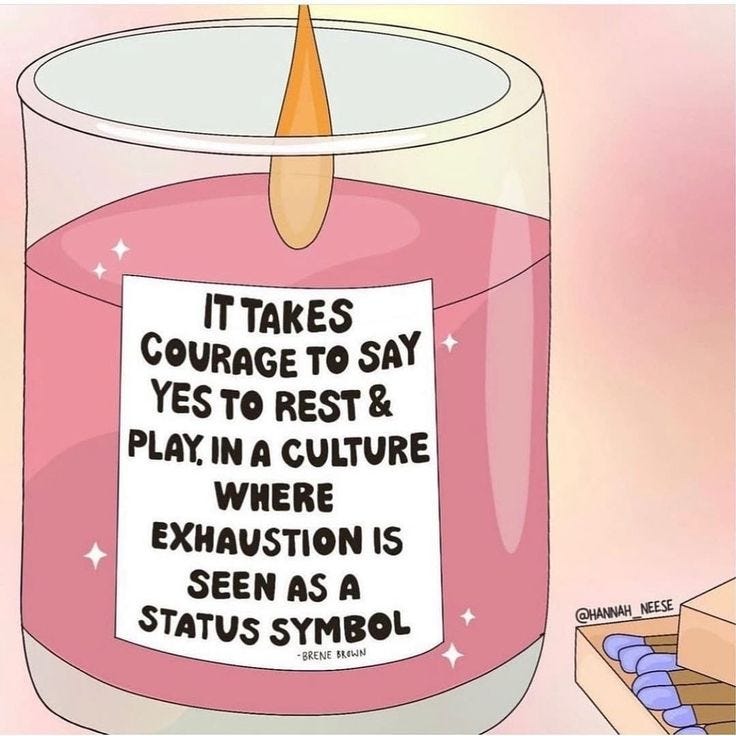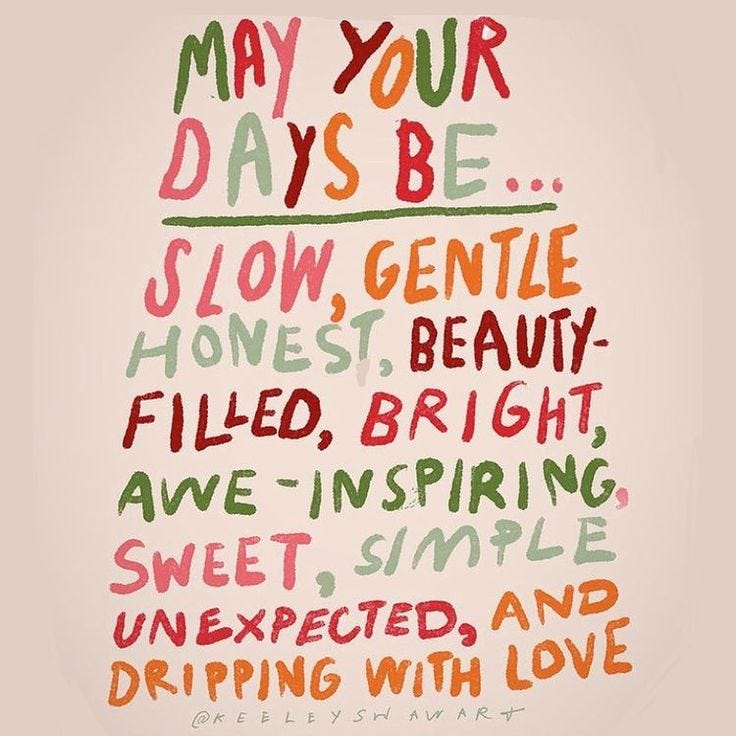Why Slow Work Makes More Sense Now Than Ever (Part 5)
My Small Act of Defiance Against Traditional Work Life
Welcome to the Slow Work & Business Series!
This is a space to explore how work can feel joyful, mindful, and less overwhelming. As someone navigating life after the rush of traditional work, I’m documenting my journey—projects, lessons, and all the highs and lows. If you’re redefining work on your own terms, let’s figure it out together with heart and ease.

A couple of years ago, I came across this thing called the Slow Food movement while teaching my Italian student. He introduced me to this movement, which originated in Italy as a protest against fast-food chains. I was intrigued, and as one always does, I researched it. At the same time, I was developing a conflicting relationship with work and how I connected with it. The values and foundations of Slow Food made me wonder if there was an alternative to it for work. And yes, there was.
I researched again. People, at the time, were exploring different lifestyles—whether in work or location. It was the same period when digital nomads were emerging, and Bali was becoming a hotspot.
I came across a website called Sloww, which had so much information about Slow everything. It even talked about Slow Money. I also explored YouTubers like Exploring Alternatives, Heal Your Living (doesn’t exist anymore), and Ecofriendly Lia—people who were exploring a different life than what was commonly known. I was fascinated by this whole emerging lifestyle and called it "intentional living" because it seemed to be about designing a lifestyle based on conscious intentions rather than living on autopilot like everyone around me.
I even started a YouTube channel on this concept, Intentional Living, where I intended to talk about reflecting on and understanding life values. I couldn’t continue because the fear of being seen was too loud in my head, but it is fading slowly as I continue to show up here on Substack. It has visibly decreased as I share more of my writing.
Anyway, as I see it now, we live in a world that demands we pause and reflect on how we associate with work. It’s time to defy the old standard of work and define what work means to us. Growing up, we saw people structuring their entire lives around work—housing, schools, clothing, hobbies, vacations—everything was thought out with work as the primary element defining every other aspect of life.
Recently, a CEO of a consulting agency in India talked about working 70-hour week. I’ve often heard big tech leaders discussing how many hours they put in. I’m not sure where this is all heading but it is scary. I am one of the more fortunate ones who love what I do, but still, writing all day would bore the heck out of me, and I wouldn’t be able to write if I didn’t add variety to my life. What would I really write about? And is life all about working yourself until the end of days?

Then there’s the rise of productivity YouTubers and the endless buzzwords—productivity, hustle, efficiency—that define us as if our worth depends on staying glued to our work. I even came across someone saying that if they could avoid sleeping, they would, just so they could work more.
Rest has become a byproduct of work—something to be "earned." How often do we hear phrases like you deserve rest only after putting in a certain number of hours? We earn vacations, weekends, time with our friends, even a beer at times. Even our introductions are centered around work.
I also have a theory about why we are so deeply ingrained in overworking and defining ourselves through work. I believe it starts with how we were educated—at least in the schools I attended. Everything revolved around how much we studied and how good our grades were. That took us away from our creativity and natural problem-solving skills. We were taught to work hard, push through errors, and focus on discipline rather than fostering creativity, experimentation, and play. Play and creativity is so innate to human nature or nature in general like when I interact with my nephew, he has so many random questions and so much play in his life. That human can instantly spark so much creativity in conversations as compared to some of his older counterparts, who have generic questions about weather, work and more work.
I think this system was born during the Industrial Age, when factories required a workforce that followed orders and had a singular set of skills. This approach carried into our education system, where we were trained to be obedient workers rather than creative thinkers. Maybe industrialization made us take work too seriously. The lightness that comes from touching every part of life feels distant now.
Then came the entry of Slow Work into my life. After years of experimenting and exploring this concept, I see something special in it—it looks different for different people. Most importantly, it puts your values at the center stage, and values differ from person to person. It’s a customized way of working.
For some, it might look like working for six months and taking six months off. For others, it might be a four-day workweek. But mostly, Slow Work is less about rigid hours and more about your relationship with work.
This is how I define Slow Work and what it means to me: it doesn’t mean working slowly or fewer hours. It means having a more intentional and mindful approach to work.
I come from a creative background. I love creating—whether it’s products, websites, writing, or meditation tapes. I don’t see myself as having a single skill; rather, I have multiple interests that contribute to each other. My work is not linear—it’s interconnected, like seasons and ecosystems, where everything flows into everything else.
For example, I meditate and offer meditation sessions. At the same time, I travel, so I created meditation tapes for travelers. I also have a background in advertising, so I’ve worked as a copywriter and branded content creator, using those skills for promoting low-waste living which I also practice when I can.
Slow Work looks different for me every day. It has a vision centered around me and my dreams. It’s not about clocking in hours but about integrating work with play. It means that my hobbies, interests, reading, writing, movies, conversations, and travels all contribute to my work. It’s an unstructured way of being and living.
And at the heart of it is intention—the intention of play and exploration.
I believe exploration keeps us curious, interested, and engaged. And isn’t that the kind of life we should be aiming for?
And as I end this for today, I want to wish for you more slow days, a slow life and most importantly more play - genuine, bonkers play. So when you are 90 and you look back, your stories might start from “When I was looking at a caterpillar one day… over one time we were working on this campaign...”
Read The Whole Series Below
Part 1: Why I Left Traditional Work
Part 2: Building A Life After Traditional Work
Part 3: Building My Work Boundaries
Part 4: How To Prepare Life After Traditional Work
Part 5: Why Slow Work makes More Sense
Part 6: Lessons From My First Meditation Course
Part 7: Years of Navigating Work Rush & Anxiety
Part 8: How I Am Learning To Trust The Process
Part 9: The Quiet Math of Worth: Self-Employment Reflections
Part 10: The Last One: Lessons from a Life-Designed Business
Let’s connect!
If you’re walking the self-employed path, or even just dreaming about it, I hope this postcard reminds you that you’re not alone. You’re not behind. You’re just building something honest, and that takes time.
And if you’re starting out or maybe experimenting with freelancing, teaching, or offering something personal to the world, here’s something to help you get going gently: Things I Created For Freelancers. I have created multiple things whatever has helped me over the years. Check it out, maybe you will find something that you will like.
It’s my dream to work with a therapist who is also has a Yoga business. If you know anyone out there looking for help with marketing, please do let them know that I am here, dancing and jumping up and down my chair waiting to meet them.
Here’s my beloved, I invite you to drop by→ Kaustubha
I hope you’re enjoying Kaus’ Postcards. I started this publication to cultivate a writing practice and connect with people through my writing. I’ve decided that after my 100th post, I will open the publication for monetary support. Currently at 72/100.




